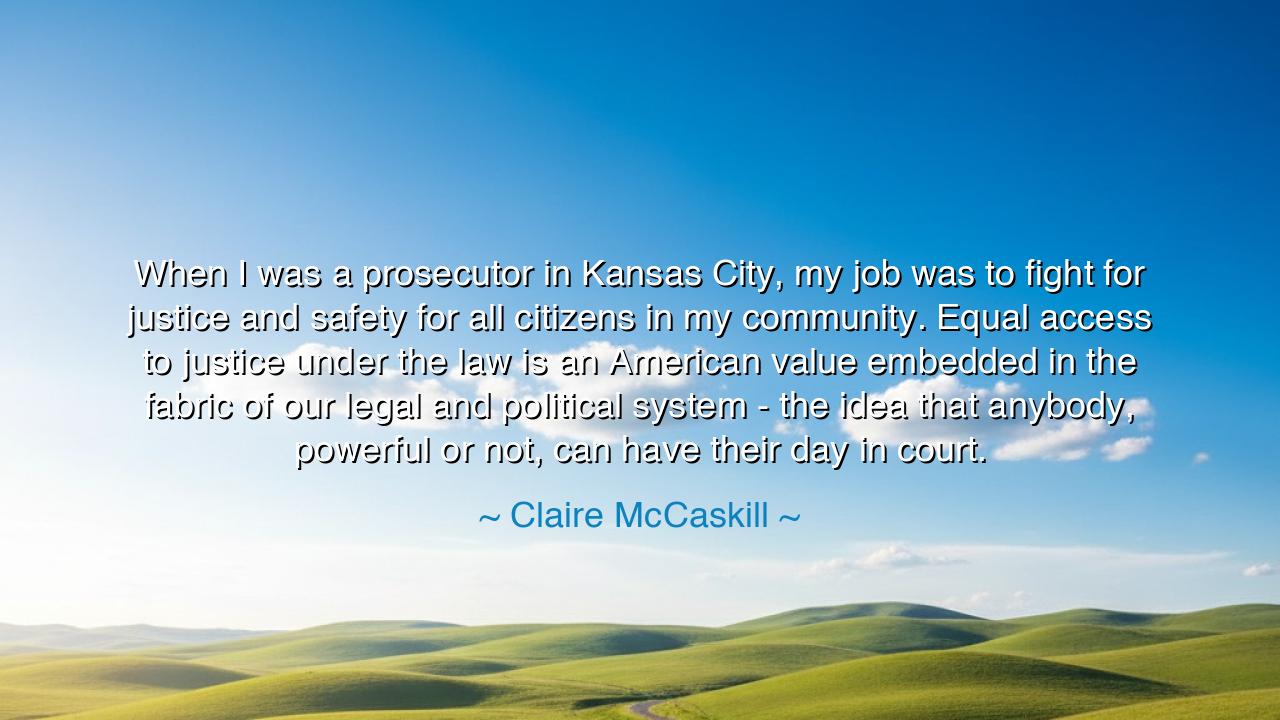
When I was a prosecutor in Kansas City, my job was to fight for
When I was a prosecutor in Kansas City, my job was to fight for justice and safety for all citizens in my community. Equal access to justice under the law is an American value embedded in the fabric of our legal and political system - the idea that anybody, powerful or not, can have their day in court.






Hearken, O seekers of wisdom, to the words of Claire McCaskill, who reflected upon her labors in the service of law: "When I was a prosecutor in Kansas City, my job was to fight for justice and safety for all citizens in my community. Equal access to justice under the law is an American value embedded in the fabric of our legal and political system—the idea that anybody, powerful or not, can have their day in court." In these words lies a meditation on the sacred duty of guardianship, the universality of law, and the moral covenant that binds a society to fairness and protection.
Since the dawn of civilization, rulers and magistrates have grappled with the tension between power and equity. In Athens, judges and jurors sought to adjudicate disputes fairly among citizens of all stations; in Rome, the codification of law aimed to ensure that even the humblest plebeian might petition for redress. McCaskill’s reflection resonates with this ancient principle: that the legal system is a shield for the powerless as much as a framework for order, a structure through which the citizens of a community may claim protection and vindication.
Consider the role of a prosecutor, as McCaskill describes her own service. The task is not merely to punish, but to uphold justice and safeguard safety. In the history of law, those who wield authority without conscience have sown oppression and terror, yet those who act with fairness and courage preserve trust in the system. McCaskill’s words remind us that the job of a prosecutor, like that of a magistrate in ancient republics, is to serve the common good, ensuring that no individual, however powerful, stands above the reach of law.
The principle of equal access to justice finds its most vivid demonstration in moments when ordinary citizens confront the mighty. In the landmark case of Brown v. Board of Education, the voices of children and families overcame entrenched power to challenge segregation in American schools. Here, as McCaskill asserts, the legal system enabled the powerless to claim their rightful day in court, affirming the ideal that justice is a universal inheritance, not a privilege of the powerful.
McCaskill also emphasizes the communal aspect of the law: the duty to ensure safety and justice is inseparable from the health of the polity. A society that denies access to courts, that shields the powerful from scrutiny, erodes trust and imperils harmony. Like the magistrates of ancient cities who protected the city from internal strife, modern prosecutors uphold not merely statutes but the ethical order that sustains peace, confidence, and mutual respect among citizens.
From this reflection emerges a timeless lesson: justice is both a responsibility and a right, a covenant between the powerful and the weak, the individual and the community. McCaskill’s words remind us that the legitimacy of a legal system is measured not by the grandeur of its statutes, but by the accessibility and fairness it guarantees to all, from the humblest to the highest in society. Equal access to justice is the lifeblood of a stable and moral polity.
O seekers of wisdom, let this teaching guide your actions. Whether in positions of authority or as members of a community, uphold the principles that allow every individual to have their day in court. Respect the legal and political systems, advocate for fairness, and guard against corruption or favoritism. The prosecutor’s job, as McCaskill illustrates, is a noble charge: to serve justice, preserve safety, and ensure that the law is a force for equity rather than oppression.
Take this teaching into your daily life: honor fairness in your dealings, stand for those without power, and recognize that true strength lies not in dominance, but in the cultivation of a system that protects all. By doing so, you participate in the timeless labor of civilization, ensuring that citizens of every station may find redress, security, and affirmation of their dignity. McCaskill’s reflection teaches that the law, when rightly applied, is not merely a mechanism of order, but a sacred instrument of justice for all.






AAdministratorAdministrator
Welcome, honored guests. Please leave a comment, we will respond soon